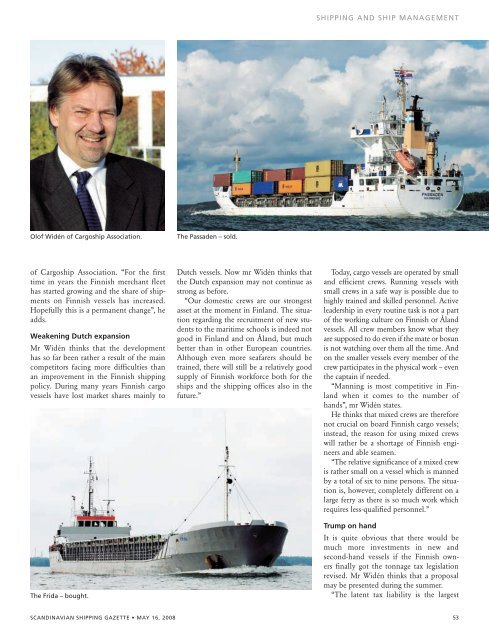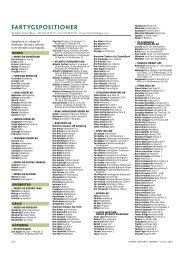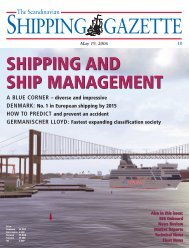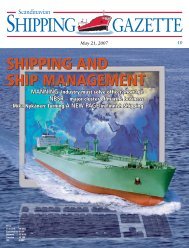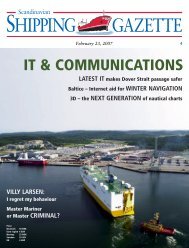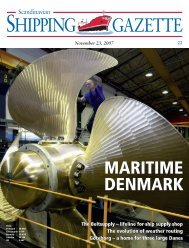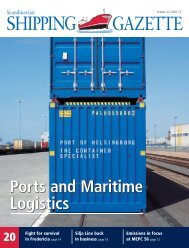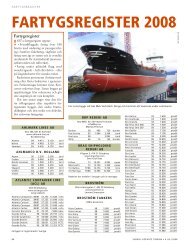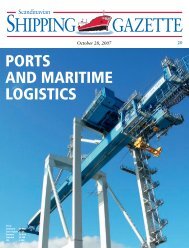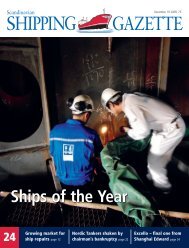SSG No 10 - Shipgaz
SSG No 10 - Shipgaz
SSG No 10 - Shipgaz
- TAGS
- shipgaz
- shipgaz.com
Create successful ePaper yourself
Turn your PDF publications into a flip-book with our unique Google optimized e-Paper software.
Olof Widén of Cargoship Association.<br />
of Cargoship Association. “For the first<br />
time in years the Finnish merchant fleet<br />
has started growing and the share of shipments<br />
on Finnish vessels has increased.<br />
Hopefully this is a permanent change”, he<br />
adds.<br />
Weakening Dutch expansion<br />
Mr Widén thinks that the development<br />
has so far been rather a result of the main<br />
competitors facing more difficulties than<br />
an improvement in the Finnish shipping<br />
policy. During many years Finnish cargo<br />
vessels have lost market shares mainly to<br />
The Frida – bought.<br />
The Passaden – sold.<br />
Dutch vessels. <strong>No</strong>w mr Widén thinks that<br />
the Dutch expansion may not continue as<br />
strong as before.<br />
“Our domestic crews are our strongest<br />
asset at the moment in Finland. The situation<br />
regarding the recruitment of new students<br />
to the maritime schools is indeed not<br />
good in Finland and on Åland, but much<br />
better than in other European countries.<br />
Although even more seafarers should be<br />
trained, there will still be a relatively good<br />
supply of Finnish workforce both for the<br />
ships and the shipping offices also in the<br />
future.”<br />
SHIPPING AND SHIP MANAGEMENT<br />
Today, cargo vessels are operated by small<br />
and efficient crews. Running vessels with<br />
small crews in a safe way is possible due to<br />
highly trained and skilled personnel. Active<br />
leadership in every routine task is not a part<br />
of the working culture on Finnish or Åland<br />
vessels. All crew members know what they<br />
are supposed to do even if the mate or bosun<br />
is not watching over them all the time. And<br />
on the smaller vessels every member of the<br />
crew participates in the physical work – even<br />
the captain if needed.<br />
“Manning is most competitive in Finland<br />
when it comes to the number of<br />
hands”, mr Widén states.<br />
He thinks that mixed crews are therefore<br />
not crucial on board Finnish cargo vessels;<br />
instead, the reason for using mixed crews<br />
will rather be a shortage of Finnish engineers<br />
and able seamen.<br />
“The relative significance of a mixed crew<br />
is rather small on a vessel which is manned<br />
by a total of six to nine persons. The situation<br />
is, however, completely different on a<br />
large ferry as there is so much work which<br />
requires less-qualified personnel.”<br />
Trump on hand<br />
It is quite obvious that there would be<br />
much more investments in new and<br />
second-hand vessels if the Finnish owners<br />
finally got the tonnage tax legislation<br />
revised. Mr Widén thinks that a proposal<br />
may be presented during the summer.<br />
“The latent tax liability is the largest<br />
SCANDINAVIAN SHIPPING GAZETTE • MAY 16, 2008 53


